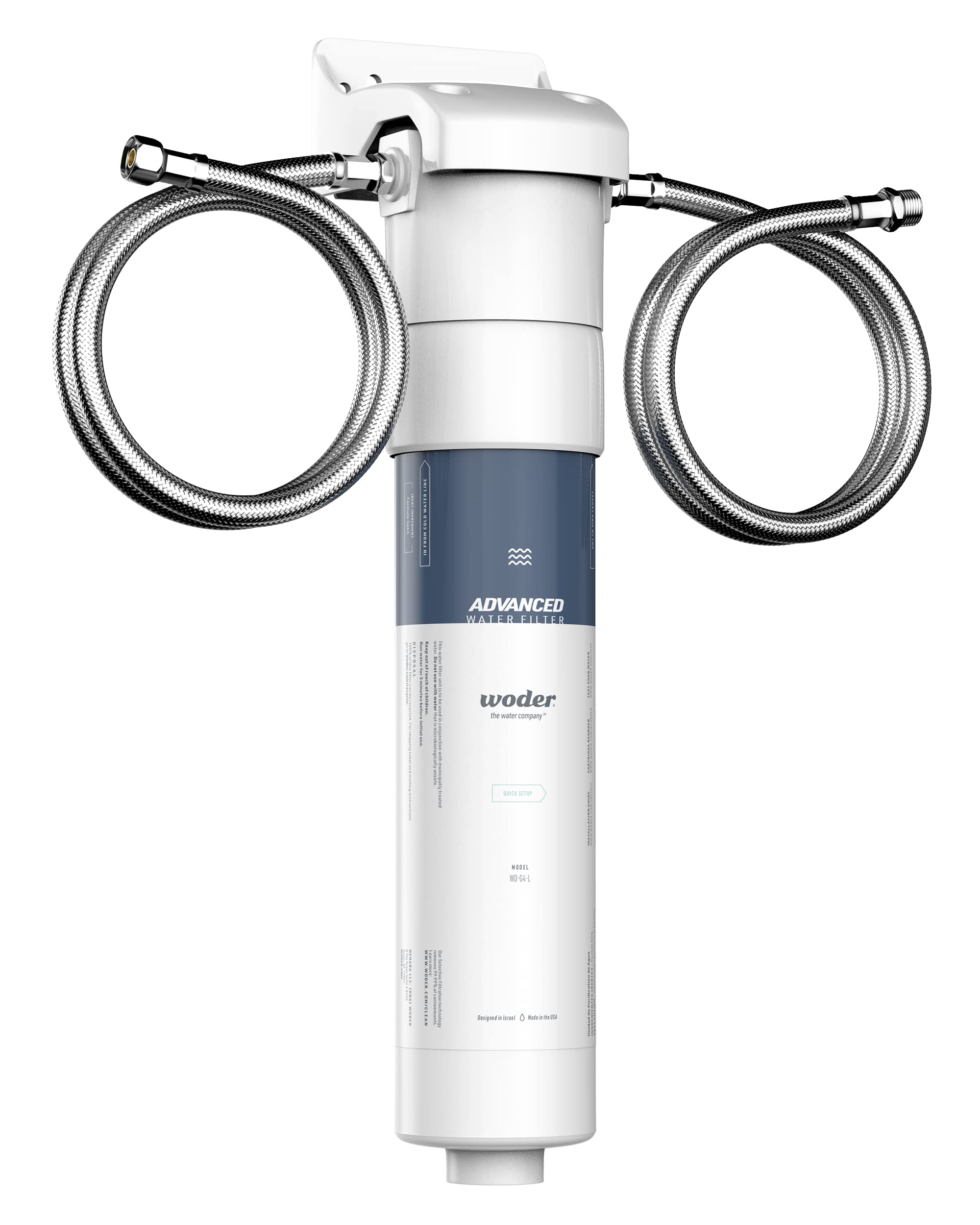Are you curious about which water filter is the most effective at removing minerals from your drinking water? Look no further! In this article, we will explore the various types of water filters available and discuss their ability to remove minerals. Whether you are concerned about the quality of your tap water or simply want to enhance the taste and purity of your drinking water, understanding which water filter is the best choice for mineral removal is key. Let’s dive in and discover the answer to this important question!
Types of Water Filters
There are several types of water filters available in the market today, each with its own unique filtration method and benefits. Understanding the different types of water filters can help you make an informed decision about which one is best suited for your needs. Here are the main types of water filters commonly used:
Reverse Osmosis Filters
Reverse osmosis filters are known for their effectiveness in removing impurities from water. These filters use a semipermeable membrane to remove contaminants, including minerals, by applying pressure and forcing the water through the membrane. Reverse osmosis filters are highly efficient and can remove up to 99% of impurities, including minerals, from the water. They are particularly effective in removing dissolved solids, such as salt, lead, and mercury.
Carbon Filters
Carbon filters, also known as activated carbon filters, use a granulated carbon material to trap and remove impurities from water. These filters work by adsorption, where the carbon material attracts and holds onto contaminants. Carbon filters are effective in removing chlorine, volatile organic compounds (VOCs), and some heavy metals. However, they are not typically designed to remove minerals from water.
Distillation Filters
Distillation filters work by heating water to create steam, which is then condensed back into liquid form, leaving behind impurities. The distilled water is then collected as the final product. Distillation filters are effective in removing many contaminants, including minerals, as the boiling process separates them from the water. However, it should be noted that some minerals can re-enter the water during the condensation process.
Ion Exchange Filters
Ion exchange filters use a resin material to exchange ions in the water. These filters work by attracting and removing minerals, such as calcium and magnesium, and replacing them with sodium or potassium ions. The exchanged ions are then flushed out during the regeneration process. Ion exchange filters are effective in reducing the hardness of water, but they may not remove all minerals completely.
UV Filters
UV filters, also known as ultraviolet filters, use ultraviolet light to kill or inactivate bacteria, viruses, and other microorganisms in water. These filters work by exposing the water to UV light, which damages the DNA of the microorganisms, making them unable to reproduce. UV filters are highly effective in disinfecting water, but they do not remove minerals or any other physical impurities.
Understanding Minerals in Water
Water naturally contains minerals that are essential for our health. These minerals are typically present as ions, such as calcium, magnesium, potassium, and sodium. Different sources of water may have varying mineral compositions, depending on factors such as the geological features of the area and the presence of mineral-rich rocks and soils.
Types of Minerals Found in Water
Common minerals found in water include calcium, magnesium, sodium, potassium, iron, and manganese. Calcium and magnesium are the primary minerals responsible for water hardness, while potassium, sodium, iron, and manganese are present in smaller quantities. The mineral content of water can vary significantly depending on the source, which can be groundwater, surface water, or even treated municipal water.
Importance of Minerals in Water
Minerals play a crucial role in maintaining our overall health and well-being. They are essential for various bodily functions, including the proper functioning of muscles, nerves, and enzymes. Calcium and magnesium, in particular, are vital for healthy bones and teeth. Potassium is important for heart health, while sodium helps maintain fluid balance. Iron is necessary for red blood cell production, and manganese acts as a coenzyme in various metabolic processes.
Health Impacts of Excessive Minerals in Water
While minerals are important for our health, excessive amounts of certain minerals in water can have health implications. High levels of calcium and magnesium can contribute to water hardness, which can lead to scale buildup in pipes and appliances. This can reduce efficiency and increase maintenance costs. Additionally, some individuals may be more sensitive to high mineral content in water and may experience gastrointestinal issues, such as diarrhea or constipation.
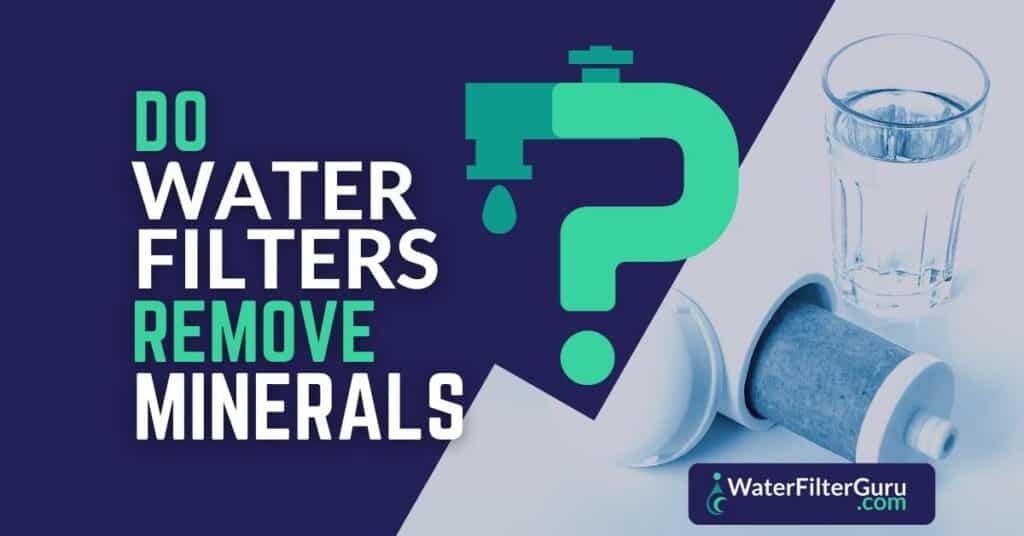

This image is property of waterfilterguru.com.
Evaluation of Water Filters
When choosing a water filter, it is important to evaluate its effectiveness in removing impurities, including minerals. Here are some factors to consider when evaluating water filters:
Filter Efficiency
Filter efficiency refers to the ability of a water filter to remove contaminants from water. Different filters have varying levels of efficiency, so it is important to choose a filter that meets your specific needs. Look for filters that are certified by reputable organizations, such as NSF International or the Water Quality Association, as these certifications ensure the filter’s performance and safety.
Removal of Minerals
Not all water filters are designed to remove minerals from water. If mineral removal is a priority for you, consider filters specifically designed for this purpose, such as reverse osmosis or distillation filters. These filters are known for their effectiveness in removing minerals, including calcium and magnesium, which contribute to water hardness.
Effect on Water pH
The pH level of water indicates its acidity or alkalinity. Some filters, such as reverse osmosis filters, can slightly lower the pH of water, making it more acidic. This acidic water may not be suitable for certain applications, such as watering plants or brewing coffee. If maintaining a specific pH level is important to you, consider filters that can adjust the pH or choose filters that have a neutral or slightly alkaline output.
Cost and Maintenance
Consider the cost of the water filter and its ongoing maintenance requirements. Some filters may have a higher upfront cost but require minimal maintenance, while others may have lower initial costs but require frequent filter replacements. Consider your budget and the long-term expenses associated with the filter before making a decision. Additionally, assess the ease of maintenance and any additional costs, such as electricity or replacement parts.
Reverse Osmosis Filters
Reverse osmosis filters are highly effective in removing a wide range of impurities, including minerals, from water. Here’s how they work:
How They Work
Reverse osmosis filters use a semipermeable membrane with very small pores to remove impurities from water. When water is passed through the membrane, the tiny pores trap larger particles, such as minerals, bacteria, and viruses, while allowing pure water molecules to pass through. The trapped impurities are then flushed away, leaving behind purified water.
Pros and Cons
One of the main advantages of reverse osmosis filters is their high filtration efficiency. These filters can remove up to 99% of contaminants, including minerals. Reverse osmosis filters also provide a thorough purification process, ensuring that the resulting water is clean and safe to drink. However, reverse osmosis filters can be slow, as the filtration process requires pressure and time. Additionally, they may lead to some water wastage, as a portion of the filtered water is used to flush away impurities.
Removal of Minerals
Reverse osmosis filters are known for their ability to remove minerals, including calcium and magnesium, from water. The semipermeable membrane effectively traps these minerals along with other impurities. As a result, the output water from reverse osmosis filters is typically low in mineral content, which can be desirable in certain situations, such as for individuals on low-sodium diets or in areas with extremely hard water.
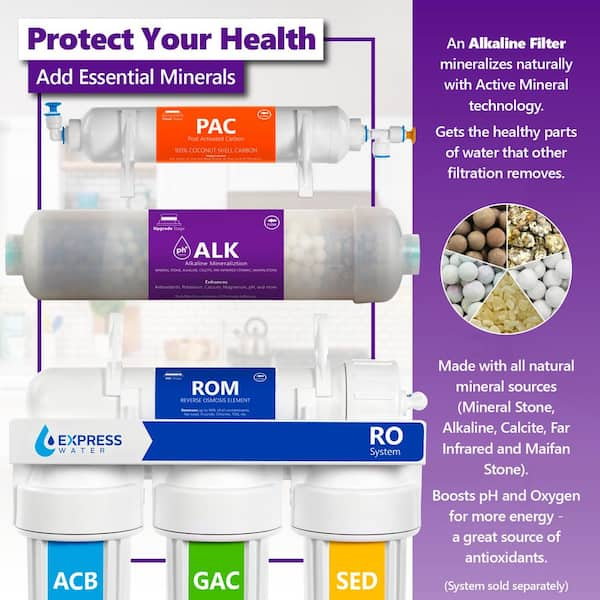

This image is property of images.thdstatic.com.
Carbon Filters
Carbon filters are commonly used for improving the taste and odor of water, but they may not be as effective in removing minerals. Let’s take a closer look at how carbon filters work:
How They Work
Carbon filters use activated carbon, which is a form of carbon processed to have small, low-volume pores. When water passes through the carbon material, the contaminants are attracted to the porous surface and physically trapped. Carbon filters can remove chlorine, volatile organic compounds (VOCs), and some heavy metals. However, they are not specifically designed to remove minerals from water.
Pros and Cons
One of the advantages of carbon filters is their ability to remove organic compounds and enhance the taste and odor of water. They are relatively affordable and easy to install, making them a popular choice for basic water filtration. However, carbon filters may not be as effective in removing certain minerals, such as calcium and magnesium, which contribute to water hardness. If mineral removal is a priority, other types of filters may be more suitable.
Removal of Minerals
Carbon filters may not effectively remove minerals from water. While they can trap some dissolved minerals if they are attached to larger particles or organic molecules, they do not have the same removal capabilities as reverse osmosis or distillation filters. If mineral removal is a concern, consider using a different type of filter that is specifically designed for this purpose.
Distillation Filters
Distillation filters are known for their ability to remove a wide range of impurities, including minerals, from water. Here’s how they work:
How They Work
Distillation filters use a simple yet effective process to purify water. The water is heated, creating steam that rises and leaves behind impurities. The steam is then condensed back into liquid form, leaving behind the contaminants. This distilled water is collected as the final product. Distillation filters effectively remove minerals, bacteria, viruses, and other impurities.
Pros and Cons
One of the main advantages of distillation filters is their ability to remove a wide range of contaminants, including minerals. The distillation process effectively separates impurities from the water, ensuring a high level of purification. Distilled water is also free from bacteria, viruses, and other microorganisms. However, it should be noted that some minerals can re-enter the water during the condensation process, although this is typically in very low concentrations.
Removal of Minerals
Distillation filters effectively remove minerals from water. The boiling process separates impurities, including minerals, from the water, and the steam that is collected and condensed does not contain the minerals. As a result, the distilled water produced by distillation filters is typically low in mineral content.
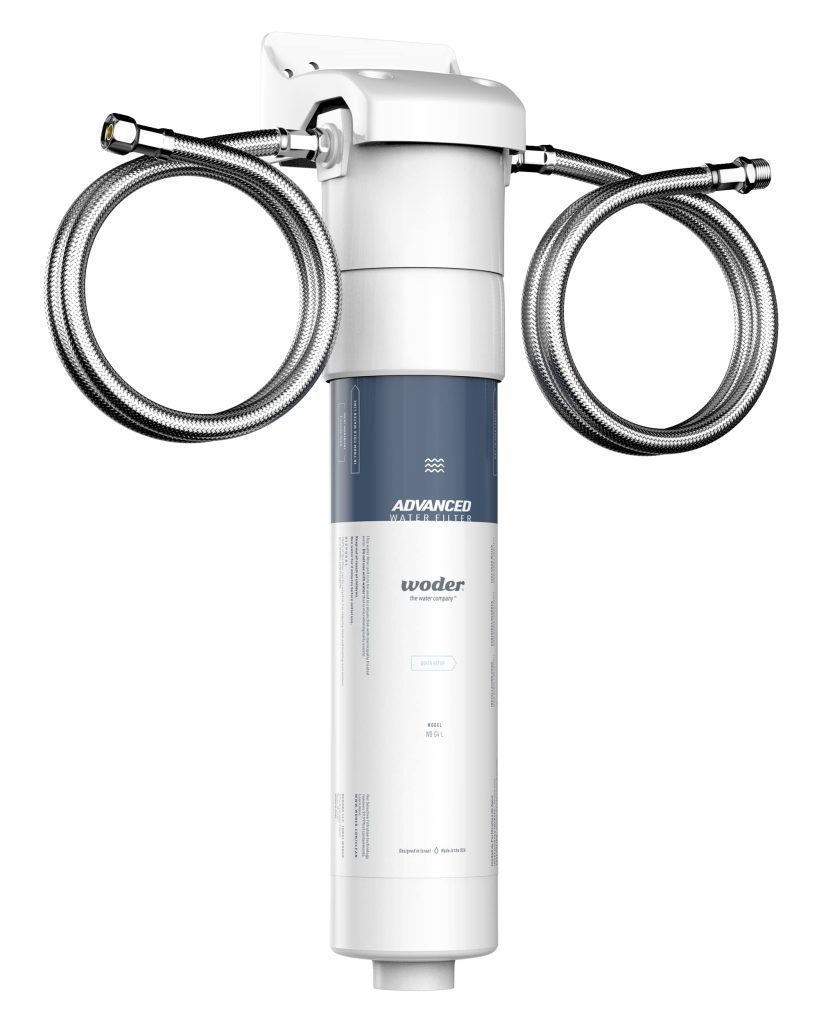

This image is property of Amazon.com.
Ion Exchange Filters
Ion exchange filters are commonly used to reduce the hardness of water by removing minerals. Let’s learn more about how they work:
How They Work
Ion exchange filters use a resin material, which contains sodium or potassium ions, to exchange ions in the water. As the water passes through the resin, it attracts and removes minerals, such as calcium and magnesium, and replaces them with sodium or potassium ions. The exchanged ions are then flushed out during the regeneration process, which involves washing the resin with a salt solution.
Pros and Cons
One of the main advantages of ion exchange filters is their ability to reduce water hardness by removing minerals that contribute to hardness. These filters can significantly improve the taste and feel of water, making it more pleasant for daily use. However, ion exchange filters are not typically designed to remove other impurities, such as bacteria or viruses. Regular maintenance is also required to ensure the efficacy of the resin and prevent the buildup of impurities.
Removal of Minerals
Ion exchange filters are specifically designed to remove minerals that contribute to water hardness. Calcium and magnesium, which are responsible for water hardness, are effectively removed and replaced with sodium or potassium ions. The resulting water is lower in mineral content, making it ideal for those who prefer soft water or want to reduce the negative effects of hard water.
UV Filters
UV filters utilize ultraviolet light to disinfect water by eliminating bacteria, viruses, and other microorganisms. Here’s how they work:
How They Work
UV filters expose water to ultraviolet light, typically generated by UV lamps. The UV light damages the DNA of microorganisms, making them unable to reproduce and rendering them harmless. UV filters are highly effective in killing or inactivating bacteria, viruses, and other microorganisms present in water. However, it is important to note that UV filters do not remove minerals or physical impurities.
Pros and Cons
One of the main advantages of UV filters is their effectiveness in disinfecting water. They provide a chemical-free and environmentally friendly method for killing harmful microorganisms. UV filters do not introduce any taste, odor, or chemical changes to the water, making it safe and enjoyable to drink. However, UV filters do not provide any physical filtration, so they are not effective in removing impurities such as minerals, sediment, or chemicals.
Removal of Minerals
UV filters do not remove minerals from water. Their primary function is to kill or inactivate bacteria, viruses, and other microorganisms by damaging their DNA. If mineral removal is a concern, consider using other types of filters that are specifically designed for this purpose, such as reverse osmosis or distillation filters.
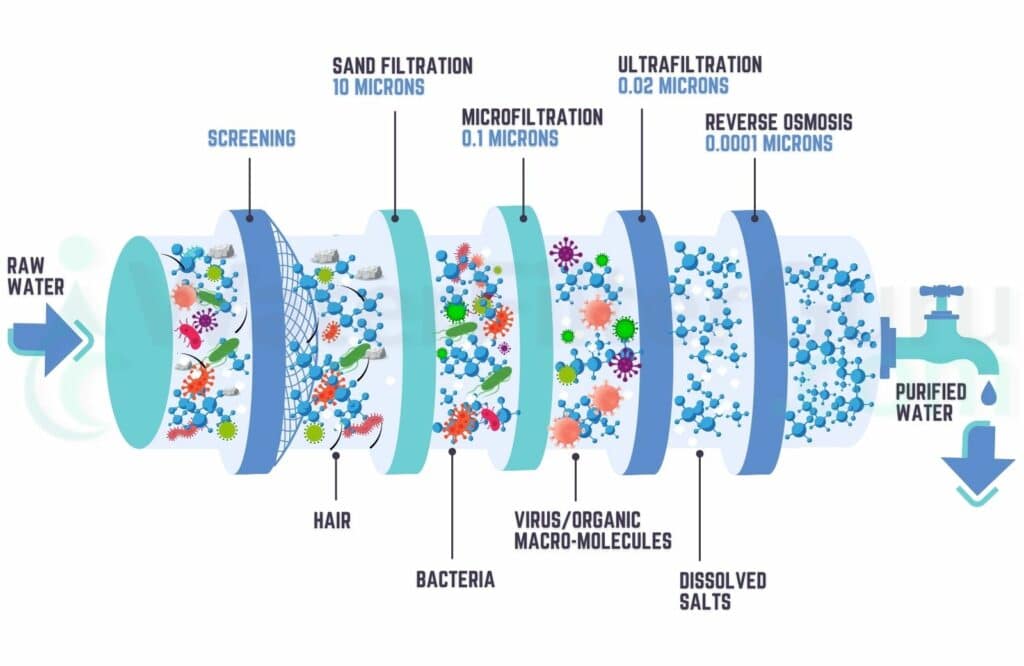

This image is property of waterfilterguru.com.
Factors Affecting Mineral Removal
The effectiveness of water filters in removing minerals can be influenced by various factors. Here are some key factors to consider:
Filter Type and Design
Different types of filters have varying capabilities when it comes to mineral removal. Reverse osmosis and distillation filters are known for their effectiveness in removing minerals, while carbon filters may not be as efficient in this regard. Understanding the specific filtration method employed by the filter can give you an idea of its mineral removal capabilities.
Water Source
The mineral composition of water can vary depending on the source. Groundwater and surface water may contain different types and concentrations of minerals. It is important to consider the mineral content of your water source when choosing a filter. If you are unsure about the mineral composition, a water analysis conducted by a certified laboratory can provide valuable information.
Contact Time
The contact time between water and the filter medium can affect the efficiency of mineral removal. Longer contact time allows for more thorough filtration, as the water has more time to interact with the filtering material. Some filters may have longer contact times built into their design, while others may require adjustments or modifications to achieve desired results.
Flow Rate
The flow rate of water through the filter can impact the efficiency of mineral removal. Higher flow rates may not provide sufficient contact time for effective removal of minerals. It is important to follow the manufacturer’s recommendations regarding flow rates to ensure optimal performance of the filter.
Considering these factors can help you choose a water filter that best suits your needs and preferences regarding mineral removal.
Conclusion
Choosing the right water filter involves considering various factors, including the type of filter, its effectiveness in removing minerals, and the overall cost and maintenance requirements. Reverse osmosis filters are highly effective in removing minerals, but they can be slow and may lead to water wastage. Carbon filters are great for improving taste and odor, but they may not effectively remove minerals. Distillation filters provide a thorough purification process and effectively remove minerals. Ion exchange filters are specifically designed to reduce water hardness by removing minerals. UV filters are great for disinfecting water but do not remove minerals. Understanding the factors affecting mineral removal, such as filter type and design, water source, contact time, and flow rate, can help you make an informed decision. By evaluating your specific needs and considering these factors, you can choose a water filter that ensures clean, safe, and mineral-balanced water for you and your family.
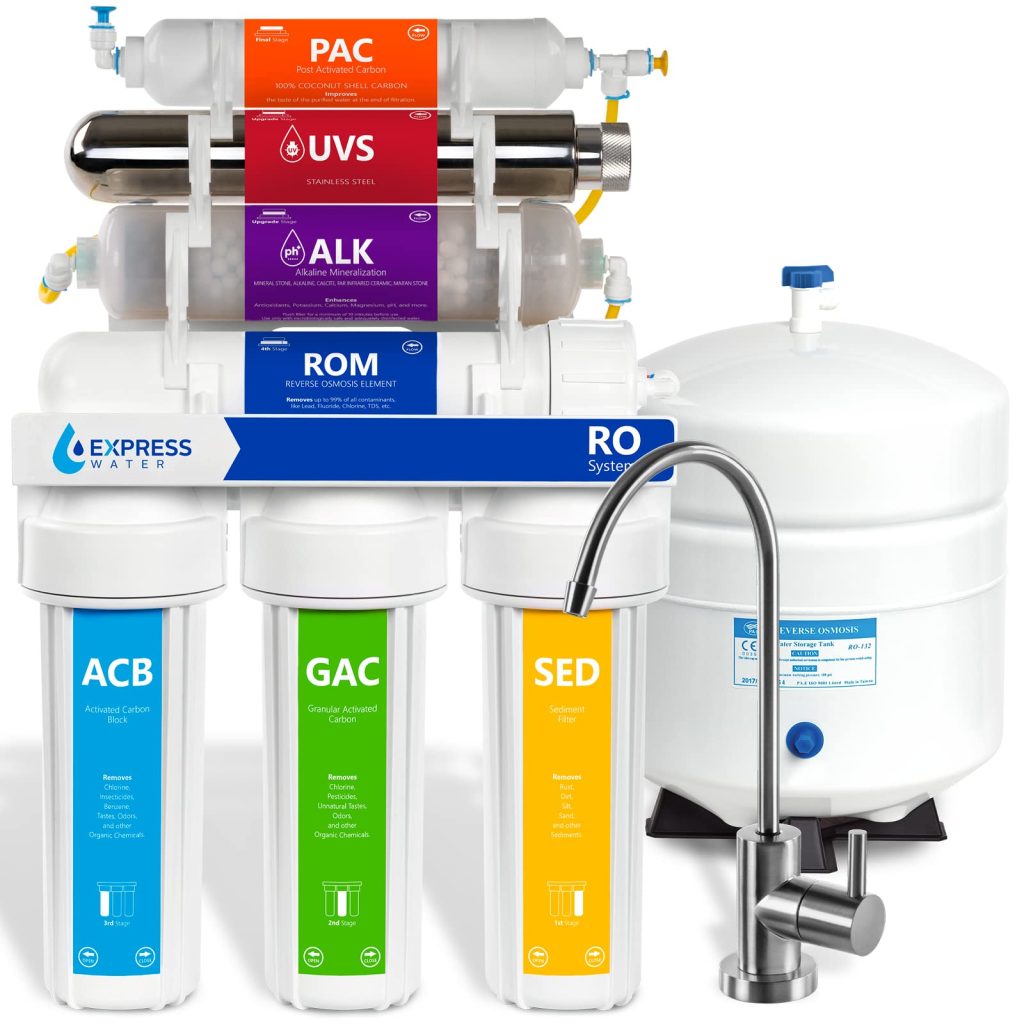

This image is property of Amazon.com.

